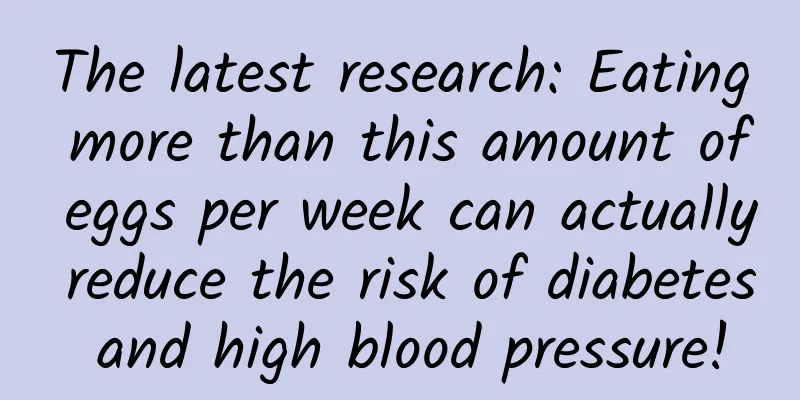The latest research: Eating more than this amount of eggs per week can actually reduce the risk of diabetes and high blood pressure!

|
Eggs are probably one of the most common foods in our daily diet. Fried eggs, steamed egg custard, egg fried rice, tomato scrambled eggs, green pepper scrambled eggs, egg fried shrimp, etc. are all delicacies made from eggs. Many studies have shown the benefits of eating eggs for the body. (Click here to learn more → What changes will occur in the body if you eat 1 egg a day? Will it increase blood lipids? Will it increase cholesterol intake?) Recently, a new study #Eating 5 eggs a week reduces the risk of diabetes and high blood pressure# has become a hot topic! Is this true? Today we will learn more about it~ Image source: A social platform Eat 5 eggs per week Reduced risk of type 2 diabetes and high blood pressure Recently, the international journal Nutrition published a new research result by a research team from Boston University in the United States. The research shows that after consuming at least 5 eggs a week, the risk of type 2 diabetes and high blood pressure can be reduced by 28% and 32% respectively! If combined with other healthy eating patterns, the health benefits of consuming eggs will be even more obvious. The study included 2,349 participants, who were divided into three groups according to their weekly egg intake: the first group consumed less than 0.5 eggs per week, the second group consumed 0.5 to less than 5 eggs per week, and the third group consumed more than or equal to 5 eggs per week. After adjusting for variables such as gender, BMI, dietary cholesterol intake, and baseline fasting blood glucose, the study found that the average fasting blood glucose concentration of participants in the third group was 3.7 mg/dL lower than that of participants in the first group, and the risk of developing impaired fasting glucose or type 2 diabetes was significantly reduced by 28%, and the risk of developing hypertension was also reduced by 32%. The third group of participants ensured that they consumed 5 eggs or more per week , and if they also followed other healthy dietary patterns, such as increasing the intake of dietary fiber, fish and whole grains , their risk of impaired fasting glucose or type 2 diabetes would continue to decrease by 26% to 29%; on this basis, if they also ensured the intake of dairy products, fruits and vegetables , their hypertension prevalence would continue to decrease by 25% to 41%. The benefits to health are cumulative! Copyright images in the gallery. Reprinting and using them may lead to copyright disputes. It seems that eating eggs has many benefits! The Chinese Nutrition Society also recommends in the "Dietary Guidelines for Chinese Residents (2022)" that adults should consume 40g~50g of eggs per day, which is equivalent to one egg per day. However, many people's egg intake does not reach this recommended intake. If you are not a person who usually eats eggs, it is strongly recommended that you increase your intake! As for how many eggs special groups (such as obese people, people with high blood lipids, pregnant women, etc.) should eat a day, you can click here to learn more → (I really want to ask: How many eggs is the healthiest to eat a day?) Eggs are an ideal nutritionally complete food An egg is a small thing that is very light in the hand, but it is a very comprehensive nutritious food. From a nutritional point of view, eggs contain almost all the necessary nutrients, including protein, fat, carbohydrates, vitamins and minerals. This comprehensive nutritional value makes eggs an ideal natural food for the human body. First of all, eggs are rich in high-quality protein . We know that protein is an indispensable cornerstone of life activities and is very important for growth and development, wound healing, immune function, etc. The difference between high-quality protein and non-high-quality protein lies mainly in the composition and proportion of its amino acids, as well as the degree of absorption and utilization by the human body. The protein in eggs is not only rich in content, but also of high quality. It contains a variety of essential amino acids, and the proportion meets the needs of the human body, and is easily absorbed and utilized by the human body. Therefore, egg protein is a high-quality protein for the human body. Secondly, eggs contain a variety of essential vitamins and minerals , such as vitamins A, D, E and B vitamins, which are essential for maintaining normal physiological functions of the human body. Eggs are also a good source of minerals such as iron, calcium, phosphorus, etc. These minerals play an important role in bone health, nervous system function, etc. At the same time, eggs are also rich in antioxidants, such as lutein and zeaxanthin, which help protect eye health. In addition, eggs also contain a certain amount of fat , which is mainly concentrated in the yolk. These fats are mainly monounsaturated fatty acids and polyunsaturated fatty acids, which are beneficial to cardiovascular health. Copyright images in the gallery. Reprinting and using them may lead to copyright disputes. In general, eggs, as a comprehensive nutritious food, contain almost all the necessary nutrients and can meet the needs of the human body in terms of growth, development, metabolism, etc. Compared with other foods, the advantage of eggs is their high nutritional density, that is, the nutritional value per unit weight is relatively high. Therefore, a reasonable combination of eggs in the diet can provide us with comprehensive and balanced nutrition. How to eat eggs Maximizing nutritional value? First, we need to ensure adequate intake. The "Dietary Guidelines for Chinese Residents (2022)" recommends that adults should consume 40g to 50g of eggs per day, which is equivalent to one egg per day. Eggs are a cheap, easy-to-buy, and high-quality ingredient. Even for people who don't have time or can't cook, it is not difficult to reach this intake. Secondly, we should choose healthy cooking methods. To make eggs a healthy food, we need to consider how to maximize the nutrients in eggs while avoiding overcooking or overprocessing. Cooking methods such as boiling, steaming, and stewing are healthier than frying and deep-frying, and can reduce the intake of fat and calories. Finally, it is recommended to incorporate eggs into other healthy dietary patterns. For example, you can eat it with vegetables, fruits, whole grains, dietary fiber, fish, etc. to get more comprehensive nutrition. Here are some recommended recipes: Tomato and Mushroom Scrambled Eggs: Ingredients: tomatoes, mushrooms, eggs, salt, oil. Method: Chop tomatoes and mushrooms and set aside. Add oil to a frying pan, pour the beaten eggs into the pan, fry until half cooked, then add tomatoes and mushrooms and continue frying. Finally, add appropriate amount of salt to taste. Sweet potato oatmeal egg porridge: Ingredients: sweet potatoes, oatmeal, milk, eggs. Method: Wash the sweet potatoes, cut them into small pieces, cook them, add them to oatmeal and milk, then pour in egg liquid and cook until thick. Codfish and Spinach Steamed Custard: Ingredients: cod, spinach, eggs, milk, salt. Method: Cut salmon and spinach into small pieces and set aside. Beat eggs in a bowl, add appropriate amount of milk and salt for seasoning. Put salmon pieces and spinach into a bowl, pour in egg liquid, and steam in a steamer until cooked. Purple Cabbage Apple Egg Salad: Ingredients: purple cabbage, apples, eggs, oil, salt, vinegar. Method: Wash and cut the purple cabbage into thin strips and cut the apple into cubes. Boil the eggs and cut them into small cubes. Add the purple cabbage strips, apple cubes, egg cubes, and appropriate amount of oil, salt and vinegar to a bowl and stir well. These recipes combine eggs with dietary fiber, whole grains, vegetables, fruits, dairy products, fish and other healthy ingredients , using healthy cooking methods and providing rich nutritional value. You can adjust them according to your taste and needs, and try making them~ References [1] Mott MM, Zhou X, Bradlee ML, Singer MR, Yiannakou I, Moore LL. Egg Intake Is Associated with Lower Risks of Impaired Fasting Glucose and High Blood Pressure in Framingham Offspring Study Adults. Nutrients. 2023; 15(3):507. https://doi.org/10.3390/nu15030507 [2] Chinese Nutrition Society, Dietary Guidelines for Chinese Residents (2022), Beijing: People's Medical Publishing House Planning and production This article is a work of Science Popularization China-Starry Sky Project Produced by: Science Popularization Department of China Association for Science and Technology Producer|China Science and Technology Press Co., Ltd., Beijing Zhongke Xinghe Culture Media Co., Ltd. Author: Zeng Xinyue, popular science creator Review | Zhong Kai, Researcher at the National Food Safety Risk Assessment Center Planning丨Yinuo Editor: Yinuo |
<<: Planting trees at an altitude of 3,600 meters, the barren mountains are turning green!
>>: What wonders will happen when a matter sun and an antimatter sun collide?
Recommend
775 new cases in 6 days, infection can be transmitted even without meeting! Urgent reminder →
Recently, the dengue fever epidemic situation in ...
How to quickly increase the popularity of your live streaming room?
Live streaming has become a standard sales method...
A brief discussion on the geological period of reservoirs in my country's main oil and gas regions
my country has a vast territory, with 9.6 million...
Short dramas about middle-aged and elderly people are going viral! Are our parents falling for the "50-year-old boss sweet drama"?
In recent months, short dramas about middle-aged ...
Is it cooler to wear white clothes in summer? The result may be different from what you think
In the hot summer, we need to consider clothing m...
Xpeng Motors updates its prospectus with a valuation of approximately US$8.6 billion
As new energy vehicles become increasingly popula...
Apple's new patented mobile phone uses a scroll screen. Netizens: It looks like an imperial edict
On June 19, Weibo blogger @科技喵 posted a post anno...
Root cause | Can stem cell transplantation really treat hair loss? Don’t rush to try it yet
gossip More and more people are suffering from ha...
Want to solve the locust plague by "eating"? Unfortunately, they have already predicted it.
Produced by: Science Popularization China Author:...
Just three steps to let you play Hammer phone "Big Bang"
Whether it is business office, online social netw...
The universal formula for Xiaohongshu's popular articles
Whether a big hit is a matter of luck, but whethe...
How to plan group buying activities on mini programs?
1. Group buying mode selection 1. Split the money...
Good method "Beautiful Greater China" takes you to appreciate the beautiful mountains and rivers of the motherland without leaving home
Good method "Beautiful Greater China" ta...
This "mechanical claw" can easily grab eggs, cut paper, and clamp chips, just like a human hand!
If a robotic hand could perform the same function...
Why did the ancestors of snakes go through so much trouble to evolve just to lose their legs?
Looking at all reptiles, snakes are a very specia...









